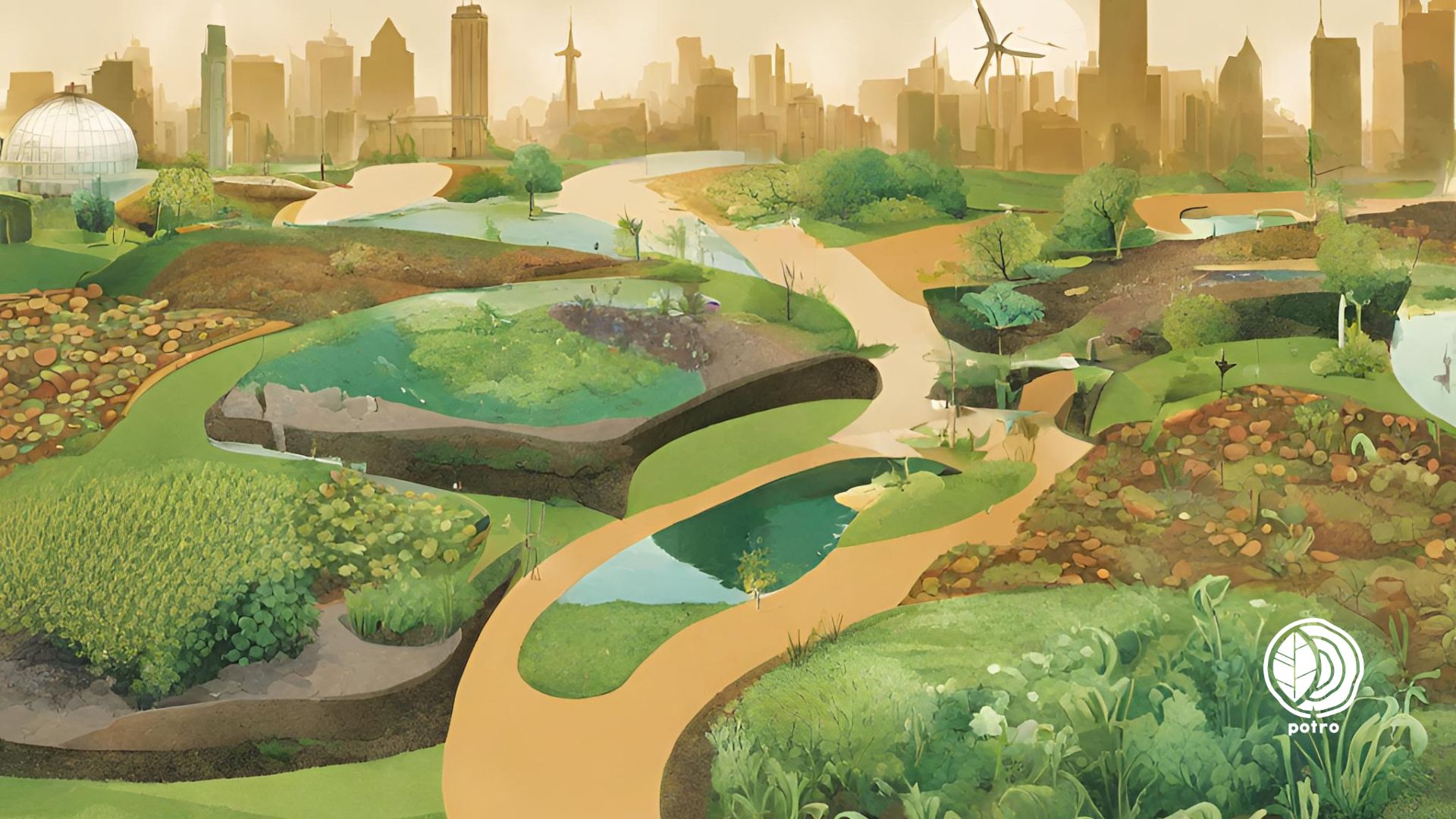Embark on a transformative journey towards sustainability with ‘Rethinking Tomorrow’. What are the odds of our redemption? Discover the answer with Potro.
What you will find in this blog:
- Action in integrating parks and trees into urban landscapes.
- Rethinking city spaces, envisioning children playing beneath leaves instead of fumes.
- Ways to replenish Earth’s lungs and combat climate change, fostering biodiversity.
- How to break free from a throwaway culture
- How to align choices with the UN’s Sustainable Development Goals for a brighter future.
- Importance of integrating renewable energy, green technologies, and sustainable solutions to minimize ecological impact.
- Ways of cultivating environmental awareness
- Examples of collective action, empowering communities and individuals to take ownership of their surroundings.

The concrete jungle sprawls, casting long shadows across a planet burdened by the weight of our progress. Deforestation scars the Earth, and whispers of resource inequalities echo through our urban canyons. The relentless cravings for development has left us at a crossroads, a stark legacy for the generations to come. But among the harsh realities, a seed of hope takes root. For within the very behaviors that brought us here lies the potential for redemption. We can harness the power of action, collective and conscious, to chart a new course, a sustainable and regenerative journey towards a better tomorrow.

Through the embrace of sustainable practices and the cultivation of a shared commitment, we possess the power to craft a future characterized by regeneration, greenery, and resilience.
Reuniting with Nature in City Spaces
Let’s advocate for green-laced cities, where parks and trees weave through concrete, reuniting us with nature’s embrace. Imagine children playing beneath leaves, not fumes, their laughter echoing through a symphony of wind and birdsong.

Singapore stands as a remarkable example of a country that successfully advocated for green urban spaces. Embracing the “City in a Garden” vision, the government strategically integrated greenery into its urban landscape, exemplified by projects like Gardens by the Bay. Here, lush green spaces, iconic Supertrees, and biodomes showcase the effective fusion of nature with urban infrastructure.
The commitment to green initiatives extends to public housing projects, where communal gardens and green rooftops are integrated. Singapore’s success lies in robust government policies, community engagement, and a focus on education, illustrating how a city can transform into a thriving urban environment that harmoniously coexists with nature.
Replenishing Earth’s Lungs
Plant a tree, ten, a hundred. Breathe life back into the planet, one seedling at a time. Each sapling planted becomes a soldier in the fight against climate change, a beacon of hope for a future rich in biodiversity.
An notable example of a successful tree-planting initiative is China’s “Great Green Wall” project. Launched in 1978, this massive afforestation project aimed to combat desertification and improve ecological conditions. The initiative involves planting trees and vegetation along the edges of the expanding Gobi Desert to create a green barrier against desertification. Millions of hectares have been afforested, with various tree species strategically planted to prevent soil erosion and promote biodiversity.

The project has not only played a crucial role in addressing environmental challenges but has also contributed to local economies by providing jobs for communities involved in planting and maintaining the trees. The Great Green Wall stands as a testament to the positive impact of large-scale tree-planting efforts on a country’s environment and sustainability.
Waste Not, Want Not
Break free from the grip of a throwaway culture. Embrace reduction, reuse, and recycling – a mantra for a circular economy where waste finds new life. Support innovators who craft eco-friendly products, paving the way for a future where every material tells a story of responsible consumption.

One example of breaking free from a throwaway culture and promoting a circular economy is the city of San Francisco in the United States. San Francisco has been a trailblazer in waste reduction and sustainability efforts. In 2009, the city implemented a mandatory composting program, requiring residents and businesses to separate food scraps and compostable materials from regular waste. This initiative significantly reduced the amount of organic waste sent to landfills.
Additionally, San Francisco has set ambitious recycling targets and encourages residents to embrace reduction and reuse practices. The city has also supported and incentivized local businesses that prioritize eco-friendly products and packaging. This comprehensive approach has positioned San Francisco as a model for circular economy practices, demonstrating how a community can collectively shift towards responsible consumption and waste management.
A Compass for Our Actions
Let the UN’s Sustainable Development Goals be our guidepost. From clean water to renewable energy, these global benchmarks offer a roadmap for a brighter future. Align your choices, big and small, with these guiding principles, and watch the ripple effect of collective action.

An illustrative example of aligning with the UN’s Sustainable Development Goals (SDGs) can be found in Denmark’s commitment to renewable energy. Denmark has been a global leader in transitioning to sustainable energy sources, aligning with SDG 7 (Affordable and Clean Energy) and SDG 13 (Climate Action). The country has set ambitious targets to generate 100% of its electricity from renewable sources.
Through a combination of wind power, solar energy, and biomass, Denmark has made substantial progress in reducing its reliance on fossil fuels. Individual choices, such as embracing energy-efficient practices and supporting renewable energy initiatives, have been pivotal in achieving these goals. Denmark’s dedication to the SDGs serves as a compelling example of how a nation can use these global benchmarks as a guidepost to create a brighter, more sustainable future through collective action.
Technology with a Green Heart
Innovation isn’t just about gadgets; it’s about harnessing the power of ingenuity for good. Embrace renewable energy sources, green technologies, and sustainable solutions that minimize our footprint on the Earth. Let technology be the bridge, not the barrier, to a world in harmony with nature.
A striking example of technology as a bridge to a more sustainable future is Tesla’s approach to electric vehicles and renewable energy. Tesla, under the leadership of Elon Musk, has revolutionized the automotive industry by prioritizing the development and mass adoption of electric vehicles. The company’s commitment to sustainable transportation aligns with the idea that innovation goes beyond gadgets; it’s about using technology to address critical environmental issues.

Tesla’s electric cars, such as the Model S, Model 3, and Model X, are not just cutting-edge in terms of performance but also contribute to the reduction of greenhouse gas emissions. Additionally, Tesla has delved into energy solutions with products like the Powerwall, Powerpack, and Solar Roof, aiming to create a comprehensive sustainable energy ecosystem. By embracing renewable energy sources and pioneering green technologies, Tesla exemplifies how technology can be a powerful force for good, serving as a bridge to a world where innovation and environmental harmony coexist.
Seeding Knowledge, Growing Responsibility
Education is the fertile ground where environmental awareness takes root. Equip future generations with the knowledge and values to become stewards of the planet. Let classrooms become green havens, and every child a champion for sustainability.
Japan serves as a noteworthy example of integrating environmental education to cultivate sustainability awareness among its youth. The “Eco-Schools” program encourages schools to adopt eco-friendly practices, fostering a sense of responsibility for waste reduction, energy conservation, and biodiversity.

Japan’s emphasis on outdoor education, such as “forest schools,” takes students into natural settings, instilling a profound connection with the environment. By transforming classrooms into green havens and empowering every child as a sustainability champion, Japan illustrates the transformative impact of education in nurturing environmentally conscious citizens.
From Individual to Collective Action
Engage your community, spark grassroots movements, and empower individuals to take ownership of their surroundings. Let every act of care, however small, weave a tapestry of collective responsibility, a testament to the power of united action.

Hold local authorities and businesses accountable. Advocate for environmental regulations that protect our planet’s resources, ensuring that progress and sustainability walk hand-in-hand. Let policy be the voice of reason, the guardian of our shared future.
Leaving a Legacy of Abundance, Not Depletion
Our legacy need not be etched in scars of deforestation and whispers of scarcity. We can rewrite the narrative, page by page, with every conscious choice, every collective effort. Today, we plant the seeds of a sustainable future, where the Earth is not plundered, but nurtured. Where the treasures we leave behind are not trinkets of materialism, but the richness of biodiversity, the purity of air and water, and the resilience of a planet reborn.

Let this be our story, let this be our legacy – a testament to the enduring spirit of humanity, not in conquest, but in stewardship. Let the future generations inherit a world teeming with life, a world where progress and sustainability dance in perfect harmony.
Together, we can make tomorrow a symphony of hope, a chorus of green echoes rising from a planet reborn.
Written by: Sunjida Afrin & Shyama Dhar








